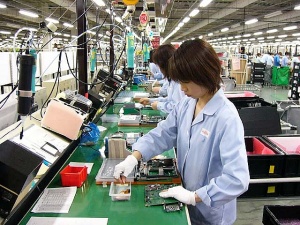World should keep eye on development of Vietnam
Over the past few decades, Vietnam has made significant steps in its economic development, transitioning from a primarily agrarian economy to a manufacturing powerhouse. Currently, it is one of Southeast Asia’s fastest-growing economies, consistently outperforming many of its neighbouring countries regarding GDP growth. This robust economic health and stability have made Vietnam an attractive destination for foreign investors.
 |
| Meir Tlebalde, ceo Sunwah Kirin Consulting Vietnam |
Geographically, Vietnam is strategically located, acting as a gateway to the vast ASEAN market. Its proximity to China and other manufacturing powerhouses in the Asia-Pacific region makes it an ideal location for supply chain operations. This geographic advantage has already lured several multinational corporations to venture into sectors like textiles, electronics, and vehicle manufacturing in the country.
Adding to this, Vietnam boasts a young, well-educated, and increasingly tech-savvy workforce that can meet the complex demands of the semiconductor and chip industry. In recognising the potential of this sector, the Vietnamese government has prioritised education and training in science, technology, engineering, and mathematics fields, which has only served to enhance the quality of its labour force.
The Vietnamese government has been proactive in its attempts to attract foreign investment. It has implemented a series of reforms aimed at improving the business environment, including simplifying business procedures, enhancing transparency, and offering tax incentives for high-tech industries, such as semiconductor and chip production. These initiatives have rendered Vietnam a more competitive and desirable investment destination.
However, it is crucial to acknowledge the challenges that Vietnam faces in its ambition to become a semiconductor and chip production hub. Firstly, the semiconductor industry is a capital-intensive sector, needing substantial investment in not only manufacturing but also research and development. While Vietnam has been successful in attracting manufacturing industries, luring high-tech industries like semiconductors could prove to be a greater challenge.
Secondly, the semiconductor industry is characterised by strict standards and complex supply chains, requiring a sophisticated business environment and advanced infrastructure. Vietnam, though developing rapidly, is still working on these aspects. To compete with established industry players like Taiwan, South Korea, and China, Vietnam will need to significantly invest in infrastructure and technological capabilities.
The geopolitical tension between the US and China could also influence Vietnam’s potential in this sector. While some companies may view Vietnam as a safer investment destination amidst the ongoing trade war between the US and China, others may exhibit caution about investing in a region with heightened geopolitical risks.
Yet, despite these challenges, the recent visits by government leaders from the US and China suggest that Vietnam is making its mark on the global stage. Companies are increasingly seeking to diversify their supply chains and reduce dependence on traditional manufacturing hubs. This creates an opportunity for emerging players like Vietnam.
While there are evident challenges in Vietnam’s quest to become a hub for semiconductor and chip production, the nation also possesses significant potential. Its strategic location, sound economic health, skilled workforce, and commitment to reform make it a promising destination for foreign investment.
To fully realise this potential, Vietnam needs to continue investing in its technological capabilities, infrastructure, and business environment, while adeptly navigating the complex geopolitics of the region.
If Vietnam can successfully address these challenges, it could become a vital player in the global semiconductor and chip production industry, fuelling its economic development for years to come. The recent visits by government leaders from the US and China are testament to Vietnam’s growing importance and its potential to become a key player in the global economy.
In the world of semiconductors and chip production, Vietnam is no longer a sideline observer. It is actively partaking in the global race, inviting and welcoming investors and manufacturers from all around the world. The country’s strategic moves, coupled with its inherent potential, make it a place of interest for nations and companies eager to explore new avenues. The recent visits by government leaders from the US and China are promising signs of Vietnam’s growing influence and the confidence that these economic powerhouses have in the nation.
Thus, while the journey ahead may be challenging, Vietnam’s eagerness, combined with its strategic advantages, paints a promising picture of its potential as a global semiconductor and chip production hub.
 | Vietnam rolls out red carpet for US chip giant’s investment Vietnam boasts huge potential to develop semiconductor and AI industries, and pledges to create favourable conditions for NVIDIA corporation, a leading chip producer in the US, Minister of Planning and Investment Nguyen Chi Dung said on December 11. |
 | Vietnam's semiconductor market predicted to reach $8.1 billion by 2028 Vietnam's semiconductor market is predicted to reach $8.1 billion by 2028, exhibiting a growth rate of 12.6 per cent over the 2023-2028 period, according to a report by IMARC Group released on December 21. |
| PM visits northern region's first semiconductor chip factory in Bac Giang Prime Minister Pham Minh Chinh on December 23 visited Hana Micron Vina Ltd., a company invested by the Republic of Korea (RoK) and the first semiconductor chip manufacturer in the northern region, which is located in Van Trung industrial park, Viet Yen district , the northern province of Bac Giang. |
 | Foxconn's ShunSin Technology to establish semiconductor subsidiary ShunSin Technology is planning to open a subsidiary in Vietnam costing $20 million. |
What the stars mean:
★ Poor ★ ★ Promising ★★★ Good ★★★★ Very good ★★★★★ Exceptional
Related Contents
Latest News
More News
- Kurz Vietnam expands Gia Lai factory (February 27, 2026 | 16:37)
- SK Innovation-led consortium wins $2.3 billion LNG project in Nghe An (February 25, 2026 | 07:56)
- THACO opens $70 million manufacturing complex in Danang (February 25, 2026 | 07:54)
- Phu Quoc International Airport expansion approved to meet rising demand (February 24, 2026 | 10:00)
- Bac Giang International Logistics Centre faces land clearance barrier (February 24, 2026 | 08:00)
- Bright prospects abound in European investment (February 19, 2026 | 20:27)
- Internal strengths attest to commitment to progress (February 19, 2026 | 20:13)
- Vietnam, New Zealand seek level-up in ties (February 19, 2026 | 18:06)
- Untapped potential in relations with Indonesia (February 19, 2026 | 17:56)
- German strengths match Vietnamese aspirations (February 19, 2026 | 17:40)

 Tag:
Tag:


















 Mobile Version
Mobile Version